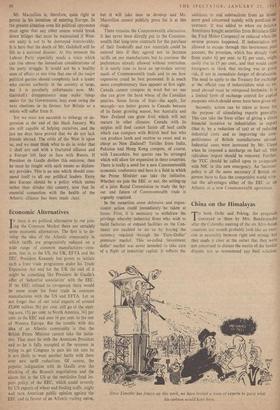Economic Alternatives I F there is no political alternative to our
join- ' ing the Common Market there are certainly some economic alternatives. The first is to de- velop the idea of the Atlantic community in which tariffs are progressively reduced on a wide range of common manufactures—com- mon, that is, to the US, the UK, EFTA and the EEC. President Kennedy has power to initiate such a freer trade programme under his Trade Expansion Act and for the UK the end of it might be something like President de Gaulle's offer of 'industrial association' with the EEC. If the EEC refused to co-operate there would be some scope for freer trade in common manufactures with the US and EFTA. Let us not forget that of our total exports of around £3,800 million 38+ per cent. still go to the sterl- ing area, 15+ per cent. to North America, 16+ per cent. to the EEC and over 16 per cent. to the rest of Western Europe. But the trouble with this idea of an Atlantic community is that the British Prime Minister cannot take the initia- tive. That must lie with the American President and as he is fully occupied at the moment in trying to get Congress to pass his tax cuts he is not likely to want another battle with them over new tariff reductions. Of course, the popular indignation with de Gaulle over the blocking of the Brussels negotiations and the alarm felt in the US at the restrictive food im- port policy of the EEC, which could severely bit US exports of wheat and feeding stuffs, might well turn American public opinion against the EEC and in favour of an Atlantic trading union, but it will take time to develop and Mr. Macmillan cannot publicly press for it at this stage.
There remains the Commonwealth alternative. It has never been directly put to the Common- wealth that long-term contracts for the purchase of their foodstuffs and raw materials could be entered into if they agreed not to increase tariffs on our manufactures but to continue the preferences already allowed without restriction. It is surely time to have an up-to-date survey made of Commonwealth trade and to see how expansion could be best promoted. It is much more complementary than appears at first sight. Canada cannot compete in wool but no one else can ,grow the hard wheat of the Canadian prairies. Some forms of fruit—the apple, for example—are better grown in Canada because of its faster growing season, but Australia and New Zealand can grow fruit which will not mature in other climates. Canada with its surplus mill feed cannot fatten off beef cattle which can compare with British beef but who can produce lamb and mutton as sweet and as cheap as New Zealand? Textiles from India, Pakistan and Hong Kong compete, of course, with Lancashire, but quotas can be arranged which will allow for expansion in these countries. There is really a need for a new Commonwealth economic conference and here is a field in which the Prime Minister can take the initiative. Whether we join the EEC or not, the setting-up of a joint Royal Commission to study the lay- out and future of Commonwealth trade is urgently required.
In the meantime some defensive and expan- sionist action could immediately /be taken at home. First, it is necessary to withdraw the privilege whereby industrial firms who wish to build factories or expand facilities on the Con- tinent are enabled to do so by buying the currency required through the 'Euro-Dollar' premium market. This so-called 'investment dollar' market was never intended to take care of a flight of industrial capital. It reflects the additions :a and subtractions from an invest- ment pool concerned mainly with portfolio in- vestment. It was added to when on balance Americans bought securities from Britishcrs (like the Ford Motor Company) or reduced when the reverse process happened. If industrialists are allowed to escape through this investment pool account, the premium, which has already risen from under 61 per cent. to 8+ per cent., might easily rise to 15 per cent., and that would cause foreigners to think that sterling was at grave risk, if not in immediate danger of devaluation. The need to apply to the Treasury for exchange at the official rate if industrialists wish to ex- pand abroad must be reimposed forthwith. It is a limited form of exchange control for capital purposes which should never have been given ItO- Secondly, action can be taken at home for the purpose of stimulating exports generallY. This can take the form either of giving a direct financial incentive to industrialists to export (that is, by a reduction of tax) or of reducing industrial costs and so improving the com- petitiveness of British manufactures abroad. Industrial costs were increased by Mr. Lloyd when he imposed a surcharge on fuel oil. This ridiculous impost should be removed. Further, the TUC should be called upon to co-operate with NIC in this new emergency. An 'incomes' policy is all the more necessary if British ex- porters have to face the competitive world with- out the advantages either of the EEC or an Atlantic or a new Commonwealth agreement.


































 Previous page
Previous page